Top 8 Ways AI Is Transforming Logistics & Supply Chain Industry
Artificial Intelligence in logistics and supply chain management systems is still in its nascent stages, but according to 19% of consumer goods executives polled for the 2023 Retail and Consumer Goods Analytics Study, one of their top AI/ML use cases was logistics optimization. Industry leaders frequently remark that while AI has many applications, its main drawback is that it is very versatile, which emphasizes the importance of focus.
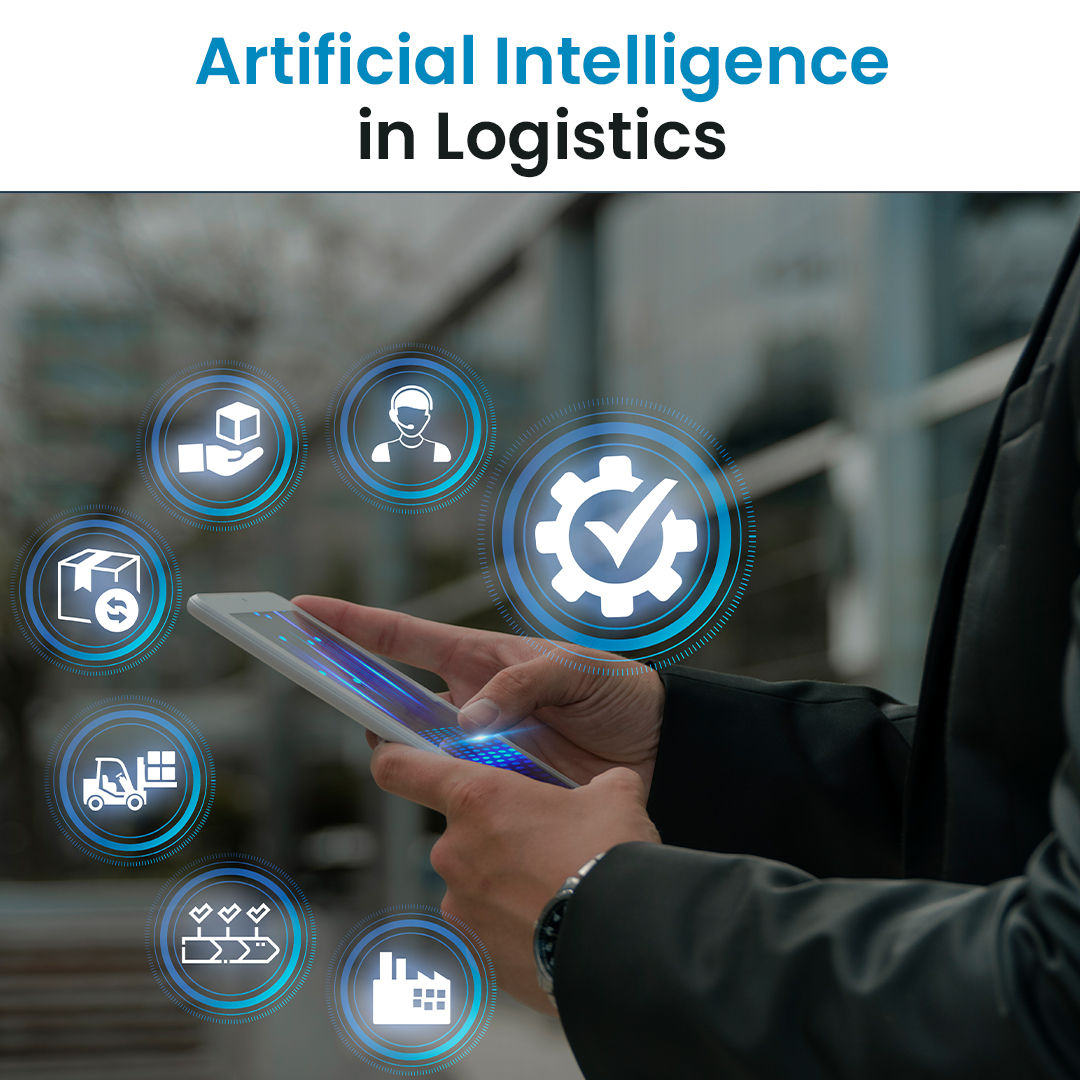
Predict Demand Like Never Before! Revolutionize Logistics Management with Our AI Precision!
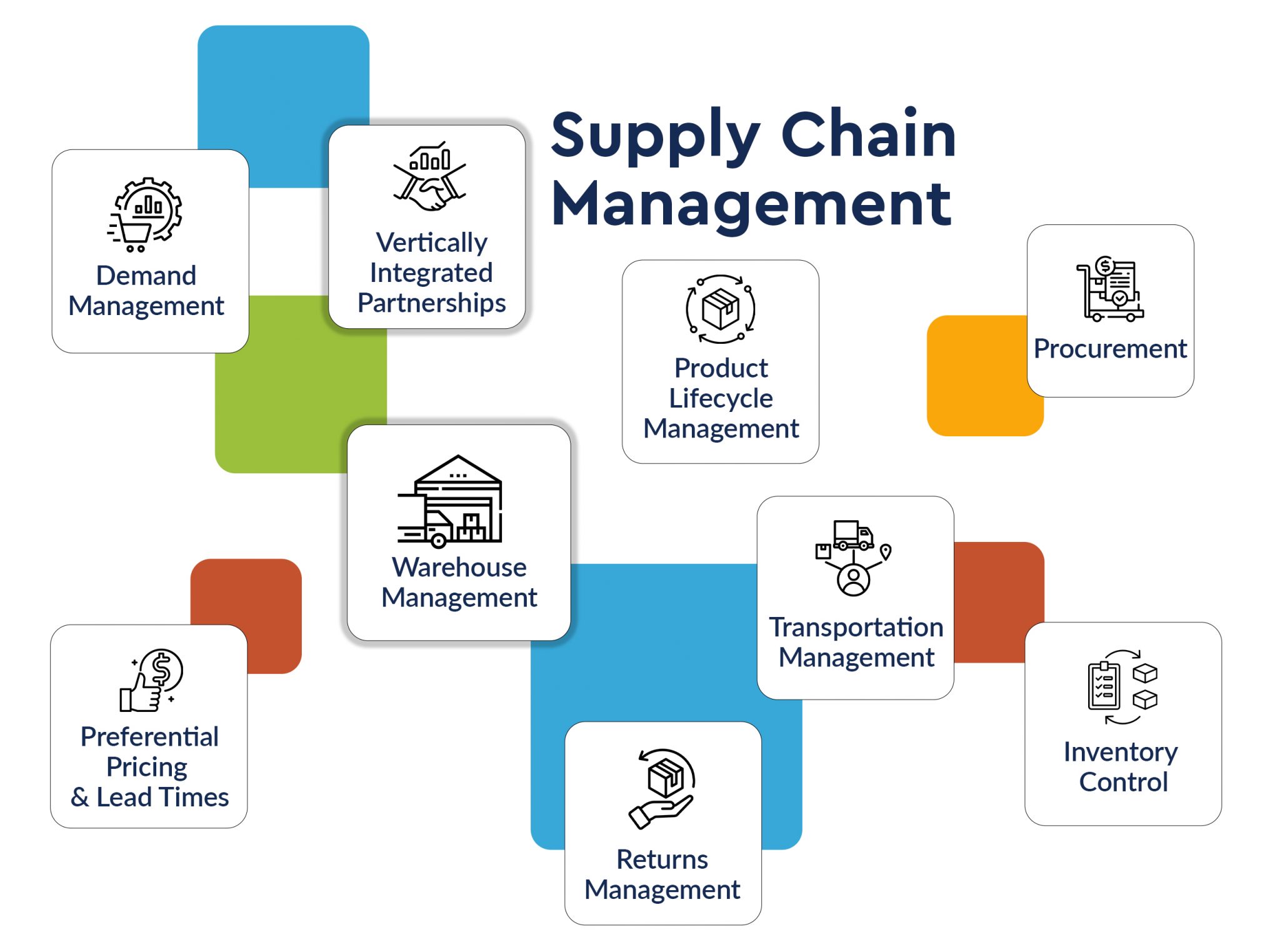
“AI’s ability to process vast amounts of data, make intelligent decisions and predict outcomes has made it a critical tool in the logistics sector. It comes as no surprise that AI and machine learning will be the technology most likely to be implemented by 2025.”- Forbes
Overview of AI in Logistics & Supply Chain Industry
Artificial Intelligence in logistics can conjure up visions of robotic strength and sci-fi automation for the uninformed, but the reality is far more practical and revolutionary. AI in logistics refers to the deliberate introduction of intelligent algorithms that can anticipate, learn, and adapt to maximize the vast network that logistics items from point A to point B. In this sense, artificial intelligence refers to a group of technologies, each with a specific function that work together to spur innovation and improve logistics and supply chain management system operations.
- In logistics, machine learning, a branch of artificial intelligence, is the dominant force in prediction. To predict future demands accurately, it trawls through previous data and present patterns.
- Natural Language Processing adds comprehension to that of a human. It handles verbal instructions in warehouses, decodes unstructured data flowing through emails and papers, and interprets and replies to consumer requests.
When combined, these AI technologies completely transform logistics and supply chain management. They usher in a world where automated solutions lessen the workload for human workers while increasing production, dynamic routing saves fuel and time, and predictive analytics aids in maintaining lean stocks.
Challenges of AI in Logistics & Supply Chain
There is no denying AI’s potential in logistics and supply chains. But it would be false to claim that the road to AI domination is clear-cut and unchallenged. It’s important to be aware of potential obstacles to creating AI-powered supply chains that work.
- System Complexities: Most AI systems are hosted on clouds and need a lot of bandwidth. To access these AI capabilities, operators may occasionally need specialist gear, and for many supply chain partners, the cost of this hardware can represent a significant upfront investment.
- Scalability: Since most AI and cloud-based technologies are incredibly scalable, more initial start-up users or systems might be needed for maximum impact and efficacy. Because each AI system is unique and different, supply chain partners and their AI development service providers will need to have a thorough discussion about this.
- Operational Costs: An AI-operated device has an amazing network of individual processors, and this network requires periodic maintenance and repair for every component. The issue with this is that, given the possible expenses and energy needed, there might be a substantial operational investment. When it comes time to replace any of these parts, utility rates can soar, which might have an instant impact on overhead expenses.
Role of AI in Logistics & Supply Chain
Businesses are transforming their demand forecast, inventory management, and logistics strategies by utilizing AI-driven solutions. This is resulting in more adaptable and efficient operations that will help them succeed in the highly competitive global market. The process starts when suppliers provide the raw materials, and it concludes when the finished product is delivered to the client. Businesses can use artificial intelligence to optimize production schedules, inventory storage capabilities, and material buying decisions, among many other areas.
AI facilitates wise choices in the logistics industry, ensuring the best use of resources and cutting expenses. AI can minimize fuel usage, forecast maintenance requirements, and improve delivery routes by monitoring and analyzing transportation data in real time. Predictive analytics driven by AI can also improve supply chain management through demand forecasting, inventory optimization, and increased operational efficiency. The supply chain and logistics sectors could see significant growth and innovation in the future because of the ongoing development and integration of AI technology.
8 Ways AI is Transforming the Logistics & Supply Chain Industry
To increase efficacy and efficiency, multiple divisions in the supply chain are using AI technologies. The following provides an overview of how AI can be applied in different logistics and supply chain departments:
 1. Predictive Analysis
1. Predictive Analysis
Demand prediction using past data can assist in keeping inventories under control and streamline processes, which can transform the logistics sector. This data analysis can be done by AI at various levels and intervals. Additionally, errors are ensured to be fewer than 1% when processing massive amounts of data using machine learning and other methods, which also makes better use of human labor possible.
Using AI and analytics to optimize supply chains can also help reduce risks and improve profitability by forecasting future events. When predictive analysis is used, shipments can be strategically planned using optimum routes, which streamlines and eases the process overall. By making wise choices, other forms of transportation can also be considered and optimized for better outcomes.
2. Workforce Management
If AI in logistics is managed well, it should require less administrative assistance. However, AI has additional effects on labor management. Artificial intelligence is being used to ensure that everyone is assigned a role that best suits them by effectively hiring new hires, training them on the job, monitoring and rating their daily performance, and identifying their strengths and weaknesses.
AI can help a business organize its hiring and training procedures more effectively. If your business is new and you want to hire staff, this will be helpful. It can be used by existing companies as well to find qualified candidates for open positions. This makes daily operations on the organization’s floors more efficient. Additionally, it produces more appropriate work assignments, which raises employee satisfaction. It so becomes a win-win scenario for both parties.
3. Inventory & Warehouse Management
Instead of using an effective inventory management system to manage its storage, businesses can focus entirely on selling its products. AI in logistics inventory management must be able to anticipate demand in addition to ensuring supply. These days, algorithms can examine vast volumes of data to assess customer preferences and predict which products will become popular shortly and which might not be able to create enough excitement. Instead of relying on demand as it occurs, businesses can plan and take the right amount of stock. McKinsey estimates that AI can reduce warehousing costs by 40% and supply chain failures by 30%.
Global e-commerce giants like Amazon, who demand rapid and complex logistics solutions, are investing their funds to assist robotics and AI developments that enable automated warehousing. Amazon has made substantial investments in warehouse automation over the past ten years through business acquisitions, hiring of top professionals, and sponsorship of competitions to find innovative solutions. You can use comparable tactics to incorporate AI in logistics sector, such as your company’s warehouse, and utilize it to manage it effectively, depending on the nature and scale of your enterprise.
4. Demand Forecasting
How do you calculate how many things users will want to purchase? AI can forecast demand, offer precise markdown estimates, and assist with discount optimization by analyzing both in-stock and out-of-stock goods. AI prediction is a component of predictive analytics since trends can impact decisions about sales and inventories. For analysis, comparison, and estimating purposes, some marketing data, and real-time data from internal sources of organizations are required.
Big data-driven logistics organizations can use predictive analytics to make well-informed decisions. They will have access to accurate sales forecasts for the future, information about transportation risks, and awareness of potential product shortages throughout time. Using artificial intelligence and big data techniques helps businesses avoid having an unsold inventory of things that go out of style or take months to store. Even short-term sales periods can be analyzed by artificial intelligence systems, giving businesses the ability to manage unexpected spikes in demand.
5. Improved Performance & Security
Establishing accurate correlations between massive, filtered data sets and regularly analyzing them considering ever-changing external conditions and daily trends is not possible with human interaction alone. AI has proven to be a forward-thinking, extremely efficient, and quick way to complete various jobs in the logistics sector. Numerous factors exist, such as favorable or unfavorable weather, the effect of location on sales, and logistics.
AI-powered programs assist in analyzing copious amounts of data, comparing it to the external circumstances of the same period, and using its intelligence to suggest certain courses of action. AI in logistics makes planning more effective, and warehouse management can utilize AI to improve inventory management by influencing data on workplace safety and alerting stakeholders to potential hazards.
6. Accelerated Delivery
The scales of contemporary warehouses with robotic technologies are invisible to online shoppers. The item’s state of, delivery speed, and desire to place another purchase from that retailer are all impacted by artificial intelligence in transportation logistics. Process speed, safety, and rationality are increased when artificial intelligence systems replace human factors and manual controls in the business.
It is now considerably simpler to predict when the goods will arrive at the delivery destinations because of delivery automation. The delivery procedure will be boosted by the pursuit of an expedient route, the ease with which the cargo can be tracked, and the expediency with which many places may be reached through air travel.
7. Logistics Data Analysis
71% of third-party logistics organizations are persuaded that big data enhances the process’s performance and quality, and 98% of them think that data-driven decisions are essential while carrying out supply chain operations. In the transportation sector, artificial intelligence offers great insights and data regarding resources, delivery, and other related topics.
Artificial Intelligence carries out a computational process that chooses relevant data points and analyzes logistics data. Data for logistics is gathered from transportation procedures, inventory management activities, etc. Logistics analytics, then, transforms ordinary logistics data into incredibly insightful knowledge.
8. Route Optimization
As it finds the most effective path for commodities to travel from one place to another, route optimization is a crucial component of logistics. This is accomplished in logistics by considering several variables, including delivery timetables, traffic, and distance. Logistics organizations may optimize their delivery routes to lower fuel costs, improve delivery times, and increase driver safety by utilizing artificial intelligence to evaluate enormous volumes of data. To choose the optimum route, AI algorithms can interpret data from a variety of sources, including traffic sensors, GPS monitoring, and weather forecasts.
AI can be used, for instance, to evaluate real-time traffic data and determine the quickest delivery route while taking both manually operated and autonomous trucks into account. This entails considering variables like traffic jams, accidents, and road closures. AI can also be used for weather-based route optimization, accounting for elements like snow and rain.
Future of AI in Logistics
The logistics industry has a bright future with AI technology, considering how it has improved customer satisfaction by automating many time-consuming tasks. According to a recent poll, nine out of ten logistics professionals who responded said technology has improved their employment prospects. Artificial intelligence has a critical role in reducing costs, saving time, increasing output, and enhancing efficiency. Future innovation and a competitive edge in the logistics sector appear to be driven by partnerships between businesses and technology suppliers.
Impact of Machine Learning and AI in Logistics & Supply Chain Industry
Many logistics companies depend on third-party logistics providers, including common carriers, subcontractors, charter planes, and other third-party suppliers, to fulfill their core business obligations. It increases the burden for logistics accounting teams in companies that process millions of invoices from tens of thousands of vendors, affiliates, and service providers each year. Artificial intelligence has made it possible to extract important data from the vast amount of disorganized invoice forms that many logistics companies receive. Businesses have employed AI for several purposes. Large-scale data analysis and system enhancement for logistics service providers can be achieved through machine learning. For the sake of delivery and management, predicting future demands and outcomes is a difficult but essential task.
Businesses can use machine learning to track and anticipate their manufacturing demands in the future, including anticipating the demand for new products. Machine learning is a highly efficient technique that combines the strengths of supervised, unsupervised, and reinforced learning.
How NextGen Invent Can Provide AI Assistance to Improve Your Logistics Management?
Working with a company you can trust, one with the necessary technological resources, and one with industry experience will help you integrate and implement the right AI tool to take your logistic management business to the next level, whether you’re a startup or an established business. At NextGen Invent, we have experience working with numerous businesses to provide them with a variety of digital solutions for all their issues, and we would be happy to do the same for you. We enjoy paying close attention to every issue and using innovative technology along with the knowledge of our team to solve them.
Our developed solutions enable businesses to achieve a 30% increase in operational efficiency and a 60% improvement in supply chain visibility. As a top logistics and supply chain development services company, we are exceptionally good at what we do.
Contact us to test out our AI development services and optimize the logistics and supply chain management operations in your company.
Related Blogs
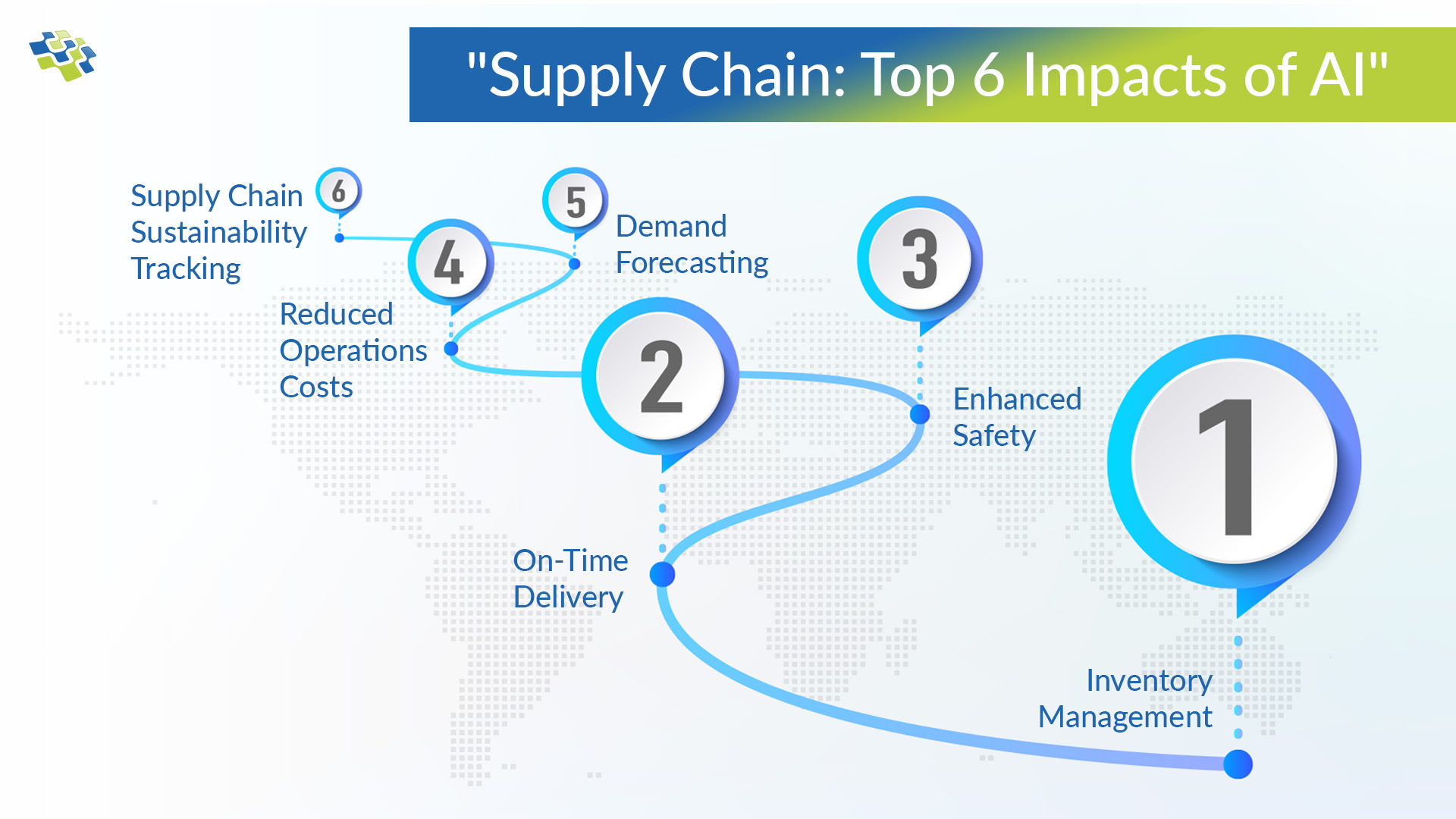
How AI Is Impacting Supply Chain Management?
Industry experts are certain that AI in supply chain management will “change the game”. It is rapidly emerging as a transformative technology, with the ability to process vast amounts of operational data generated by a range of sources, including cloud-based applications and sensors.
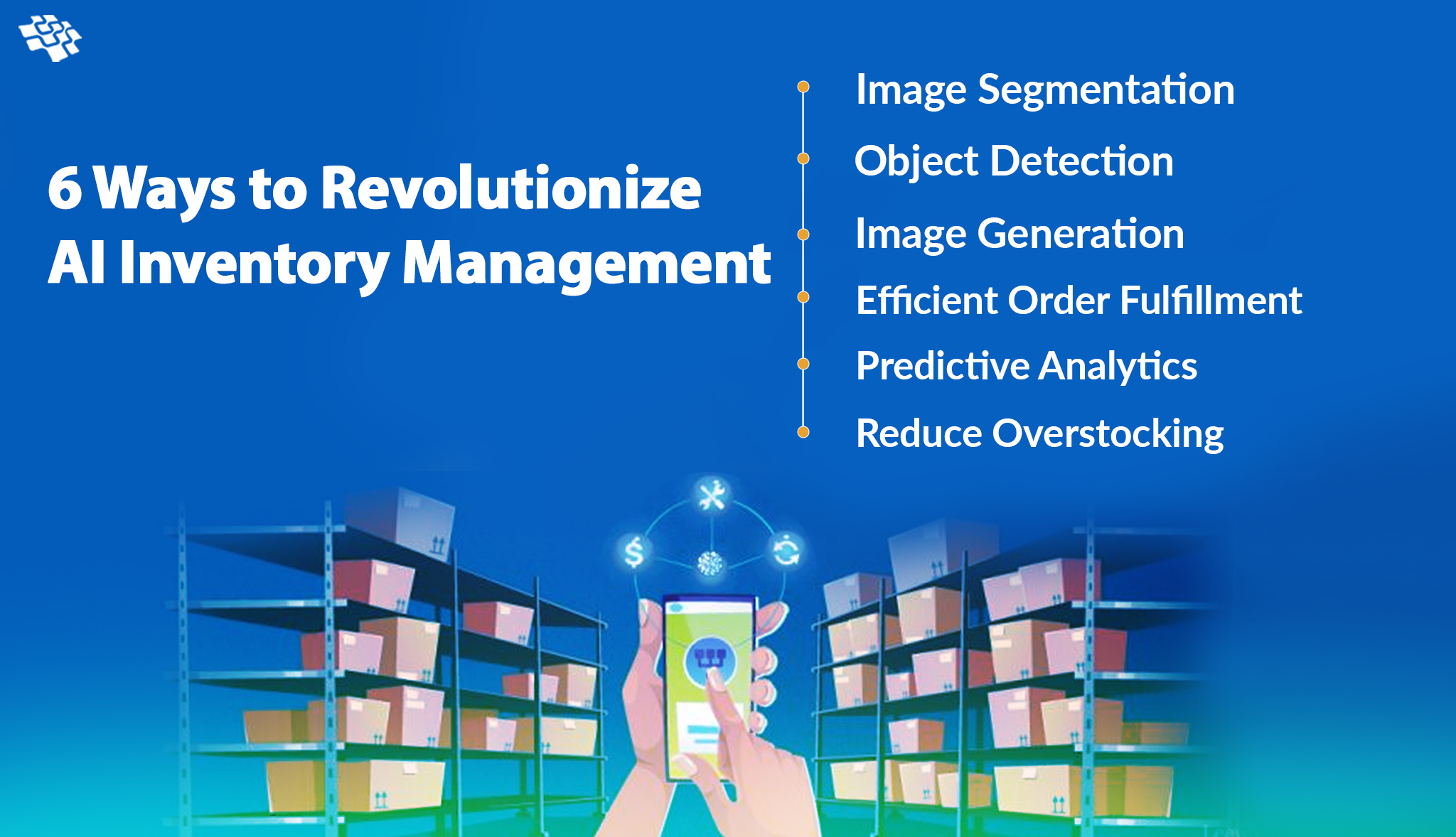
How CV is Revolutionizing AI Inventory Management?
AI inventory management is revolutionizing large-scale corporate operations by enhancing efficiency and accuracy. Through precise product location tracking, this innovative technology optimizes processing and stocking, ensuring seamless movements with the right force.
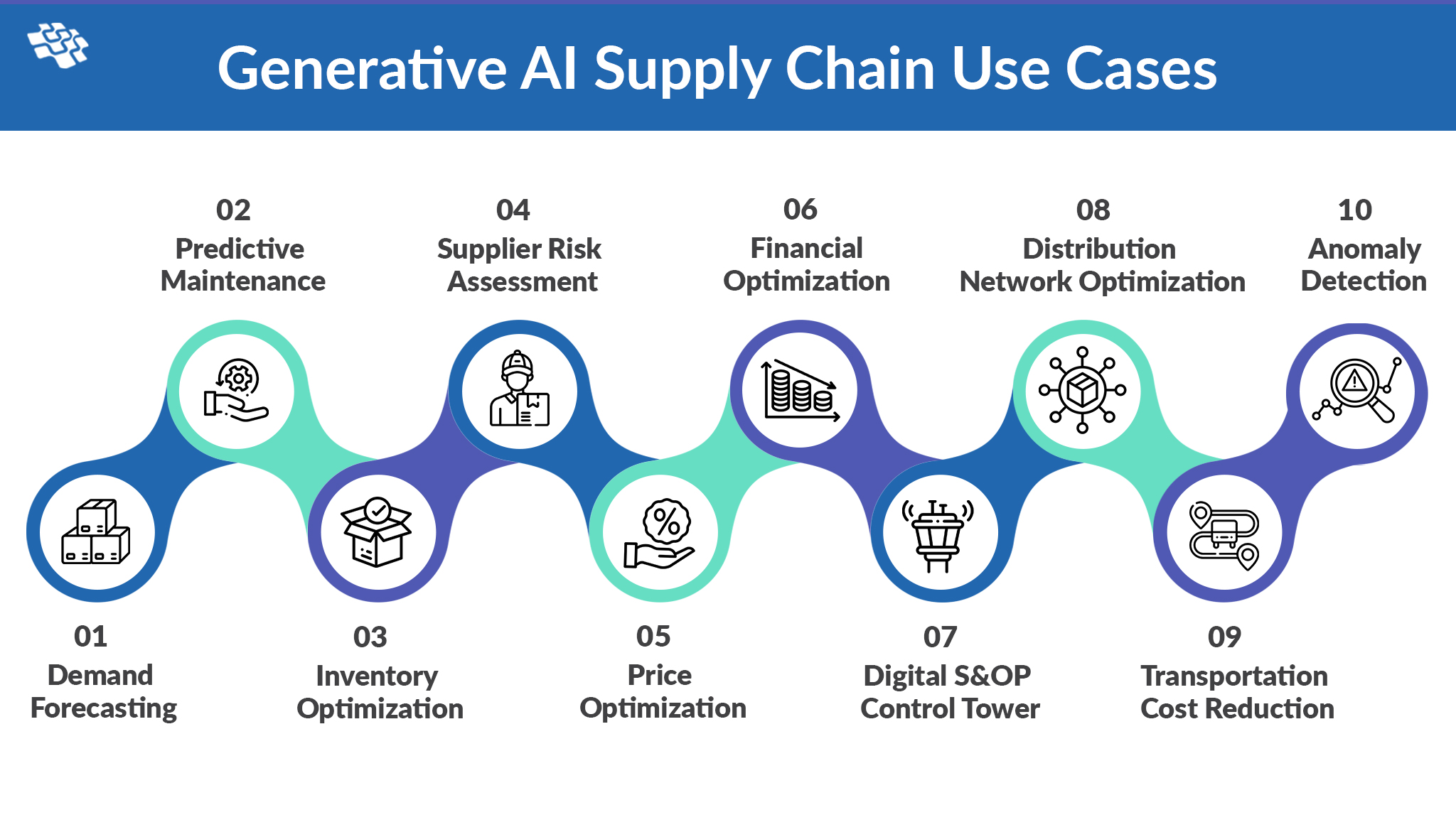
10 Most Crucial Use Cases of Generative AI in Supply Chain
AI integration has changed various industries recently, and the supply chain industry is no exception. The development of Generative AI has shown itself to be a revolutionary way to improve supply chain management.
Stay In the Know
Get Latest updates and industry insights every month.
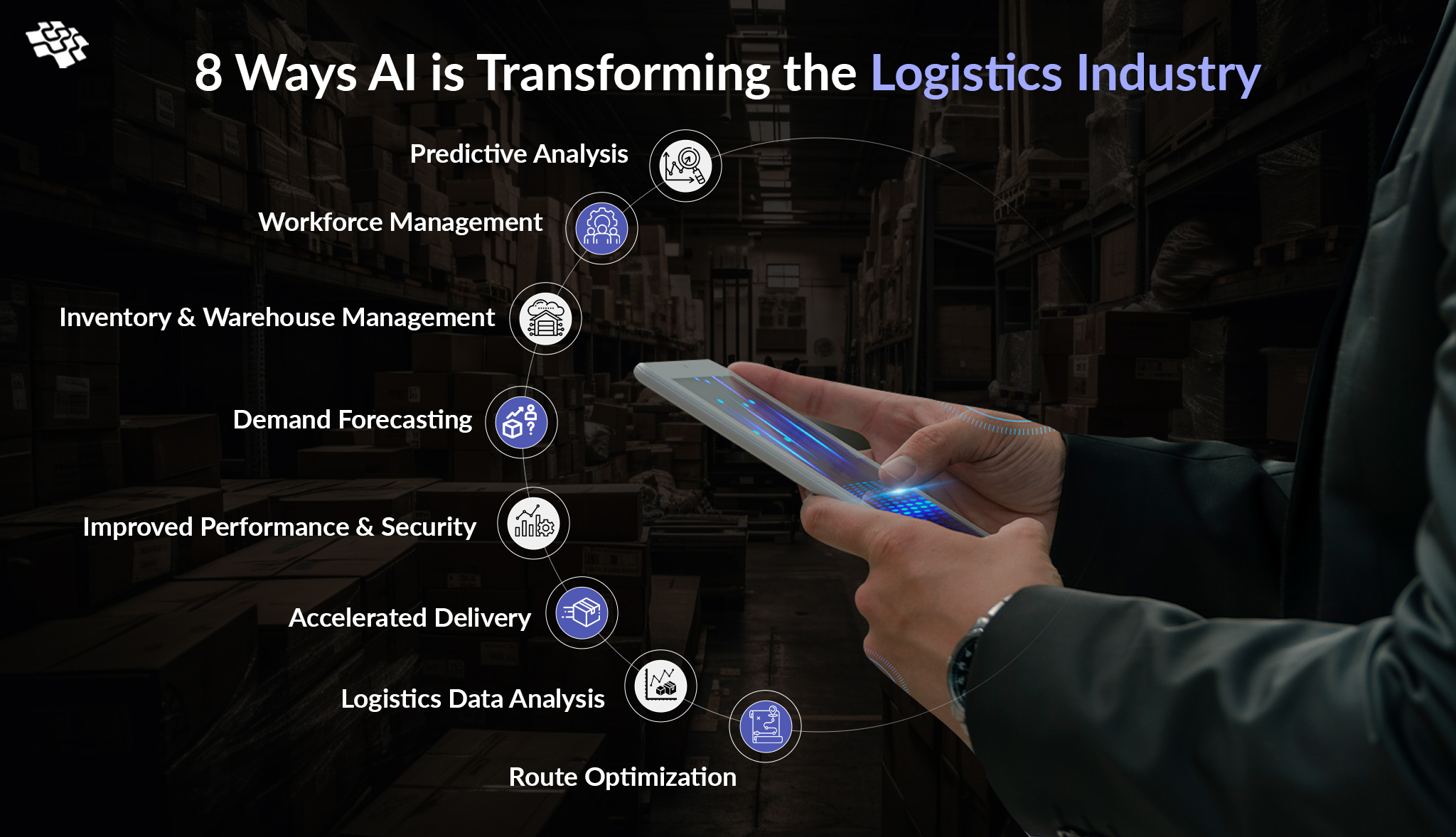 1. Predictive Analysis
1. Predictive Analysis